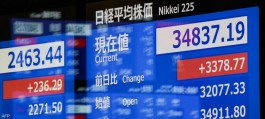Wall Street experienced sharp fluctuations as investors assessed the extent of trade tensions between the world's two largest economies. Stocks rose, then fell, before rebounding on optimism over corporate earnings.
After one of the best first-half periods for stocks since the 1950s, the market experienced brief bouts of profit-taking, described as a healthy correction after a strong rally. These declines were short-lived, amid expectations that the Federal Reserve's interest rate cuts would maintain the positive momentum in US corporate earnings.
After a rally that pushed the S&P 500 to a gain of 1.2%, the index retreated around 1 p.m. New York time, then returned to positive territory just about 30 minutes later.
Corporate results dominate trade war concerns
Investors are closely monitoring any developments related to the US-China dispute, but they quickly refocused on the fundamentals that have propelled the S&P 500 Index to more than $15 trillion since its collapse last April.
As earnings season got underway, shares of Morgan Stanley and Bank of America jumped after strong results, while positive comments on artificial intelligence from ASML Holdings boosted chip stocks. Later in the session, United Airlines Holdings reported earnings that beat expectations.
Buy-on-the-dip investors remain the main driver of the market, keeping sentiment strong despite signs of technical stress, said Mark Hackett of Nationwide.
Increasing business risks and cautious optimism
US bond prices paused after a rally that pushed the two-year yield to its lowest level since 2022, while gold rose above $4,200.
Despite the market's resilience, the ongoing escalation between Washington and Beijing has revived investor fears that the two economic powers could slide into a full-blown trade war.
US Treasury Secretary Scott Besant has proposed extending the moratorium on high tariffs on Chinese goods, in exchange for Beijing backing down from its recent plan to tighten restrictions on rare earths.
During an event organized by CNBC, Besant said that President Donald Trump is ready to meet with Chinese President Xi Jinping later this month.
Demands within the Federal Reserve to accelerate interest rate cuts
For his part, Federal Reserve Board Member Stephen Meyer said that trade tensions have increased uncertainty about growth prospects, making it necessary for the central bank to accelerate the pace of interest rate cuts.
There are more downside risks now than there were a week ago, and I think it's our job as lawmakers to reflect that in policy, he added during a CNBC event.
He pointed out that the uncertainty surrounding trade policies between China and the United States has added new risks to the economic landscape.
Despite the noise from the recent tariffs, Max Kittner of HSBC said economic fundamentals remain strong, noting that he enters 2026 with a risk-on stance and US growth forecasts that are easy to exceed.
Growing confidence and a potential consolidation phase
Stephen Kitts of Bank Reit said, Third-quarter results are important, but they are a backward-looking statement. What I will be watching closely is forward guidance, particularly any potential signs of optimism.
He added that positive guidance could reinforce itself on Wall Street and the real economy, as higher stock prices support business and consumer confidence, encouraging increased real spending.
Sam Stovall of CFRA said the market may not have finished digesting its recent gains yet, explaining that further consolidation could be on the horizon as the base of the rally has narrowed, but not enough to indicate oversold conditions.
He added that in the event of a further decline, weak prices should be exploited to buy, noting that since World War II, no year has witnessed two sharp corrections exceeding 10% each, with the average decline averaging 8.5%.
David Lefkowitz of UBS Global Wealth Management said the third-quarter earnings results should support our view that the bull market is still in place, driven by sustained earnings growth and lower interest rates.
Individual investors maintain their enthusiasm.
According to Scott Rubner of Citadel Securities, retail trader demand for call options has exceeded sell orders for 24 consecutive weeks, the longest stretch since November 2023 based on data dating back to 2020. He added that investor confidence in the stock market remains exceptional.
Craig Johnson of Piper Sandler said, While we believe a phase of consolidation is likely as investors focus on third-quarter earnings, we should continue to look for opportunities to buy on dips as we enter the fourth year of this bull market.




































